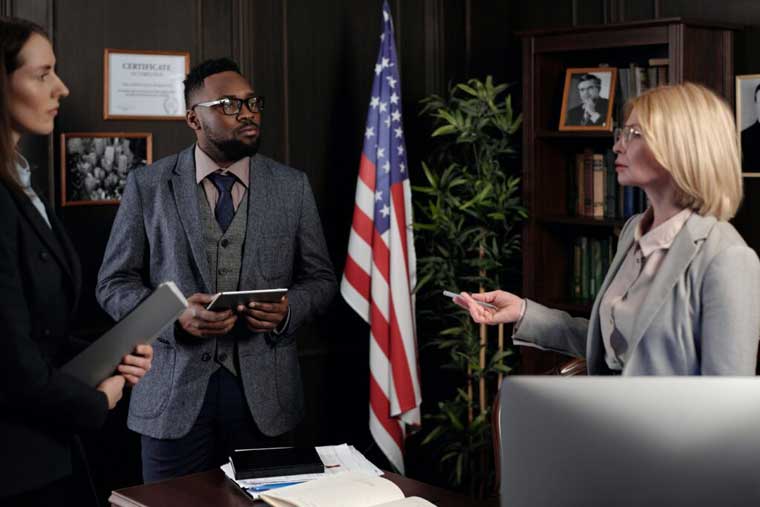What is a target letter?

Receiving a target letter from the federal government, such as the Department of Justice or other federal law enforcement agencies, is a significant event. It indicates that you are now under serious scrutiny in a federal criminal investigation. This letter suggests there’s substantial evidence linking you to a crime, marking a crucial moment where informed decision-making and strategic planning become vital.
When you receive a target letter, it’s about more than just facing legal complexities; it’s about understanding the full scope of what’s at stake and navigating the challenges ahead with clarity and professional legal support. This is a time when precise, expert legal advice is not just beneficial but essential in charting your course through the intricate and demanding processes of the federal legal system.
In this article, we’ll advise you on what to do if you’ve received a federal target letter and how a federal defense lawyer can help you navigate the situation.
Understanding Target Letters
What’s the purpose of a target letter?
When the federal government sends a target letter, it signifies a critical juncture in a federal criminal investigation. This document, typically issued by a federal prosecutor or an assistant United States attorney, indicates that there is substantial evidence linking the recipient to criminal activity.
Understanding the distinction between a ‘target’ and a ‘subject’ in such investigations is essential. A ‘target’ is someone the federal prosecutor believes has substantial involvement in a crime and is likely to be charged.
Conversely, a ‘subject’ may be involved but not necessarily to the extent that warrants criminal charges. This differentiation is crucial in the federal criminal justice system, as it impacts the approach and defense strategy of the person involved.
Content of Target Letters
Target letters are not generic; their content is specifically tailored to the individual case and person. A typical target letter will clearly outline the nature of the federal investigation, pointing out the specific federal crimes the recipient is potentially linked to.
It often includes an invitation to testify before a federal grand jury, a critical aspect of the grand jury investigation process. This invitation is not to be taken lightly, as testifying can significantly impact the course of the investigation.
Additionally, the letter may provide details about the evidence gathered and the role the recipient is believed to have played in the alleged criminal activity. Understanding the content of these letters is vital for the recipient and their federal criminal defense attorney to formulate an appropriate response and defense strategy.
What happens after you receive a target letter?
Contacting Legal Representation
Upon receiving a target letter, the first and most crucial step is to seek experienced legal counsel, specifically an attorney specializing in federal criminal defense. The complexity of the federal criminal justice system demands expertise in navigating its nuances.
An experienced federal criminal defense attorney will have the knowledge and skills to manage the intricacies of federal investigations and prosecutions effectively. Your defense counsel can provide invaluable guidance on responding to the letter, preparing you for a potential federal grand jury investigation, and protecting your constitutional rights throughout the process.

Dos and Don’ts After Receiving the Letter
The period immediately following the receipt of a target letter is pivotal. Recipients should avoid specific actions that could exacerbate their situation. Paramount among these is resisting the urge to destroy evidence or contact potential witnesses, as these actions can lead to additional charges such as obstruction of justice.
Equally important is the preservation of all relevant documents and communication, which might be crucial for the defense. Recipients should also refrain from discussing the case with anyone other than their attorney, as such conversations could be used against them. Following these guidelines helps ensure that the recipient’s rights are protected and that they do not unintentionally harm their legal position.
Potential Consequences and Strategies
Does a target letter mean you will be indicted?
Receiving a target letter does not guarantee that you will be indicted, but it does indicate serious consideration by federal prosecutors. However, an indictment depends on various factors, including the strength of the evidence, the outcome of the investigation, and the decisions of the prosecutors and grand jury.
It’s a strong signal to seek legal counsel, as the situation can rapidly evolve based on the ongoing investigation and legal strategies employed.

Legal Consequences
The issuance of a target letter can lead to a range of legal consequences in the federal criminal justice system. At one end, charges could be filed, leading to trials and the prospect of conviction. Conversely, the situation might be resolved through plea agreements or even dismissal, depending on the circumstances and available evidence.
The specific consequences depend largely on the nature of the alleged crime, the strength of the evidence, and the strategies employed by both the defense and the prosecution.
Strategies for Addressing the Investigation
An effective response to a federal investigation involves a combination of strategies. Proactive cooperation with authorities can sometimes lead to a more favorable outcome, but it requires careful consideration and guidance from legal counsel.
Negotiation tactics, whether aimed at reducing potential charges or reaching a plea deal, are a critical part of a defense attorney’s arsenal. Preparing a robust defense strategy in case of an indictment is essential, including gathering evidence, identifying potential witnesses, and developing legal arguments to counter the prosecution’s case.
Navigating Federal Investigation
Understanding the Federal Investigation Process
Federal investigations typically follow a structured process involving extensive evidence gathering, witness interviews, and grand jury proceedings. Understanding this process, including the role and powers of the federal grand jury, is vital for anyone involved. The timeline can vary greatly, from months to years, depending on the complexity of the case and the amount of evidence to be examined.
Dealing with Federal Prosecutors
Interacting effectively with federal prosecutors is crucial in navigating a federal investigation. It is vital to understand prosecutorial discretion and how it influences the decision-making process in federal cases. Communication strategies with prosecutors should be handled by experienced attorneys, who can negotiate and advocate on behalf of the client while protecting their legal rights. This interaction can significantly impact the course and outcome of the investigation.
Navigate Your Federal Target Letter Challenges with Norman Spencer Law Group

Receiving a target letter from the federal government is a pivotal moment that necessitates an immediate and strategic legal response. The stakes in federal criminal investigations are high, and the right approach can significantly influence the outcome. At the Norman Spencer Law Group, we understand the gravity of your situation.
Our team of experienced federal criminal defense attorneys is dedicated to providing robust and effective defense strategies tailored to your unique case. If you or someone you know has received a target letter or faces federal charges, we encourage you to reach out to us.
Contact our team today at (212) 577-6677 for a consultation, and let us help you navigate this challenging time with our expert legal support.